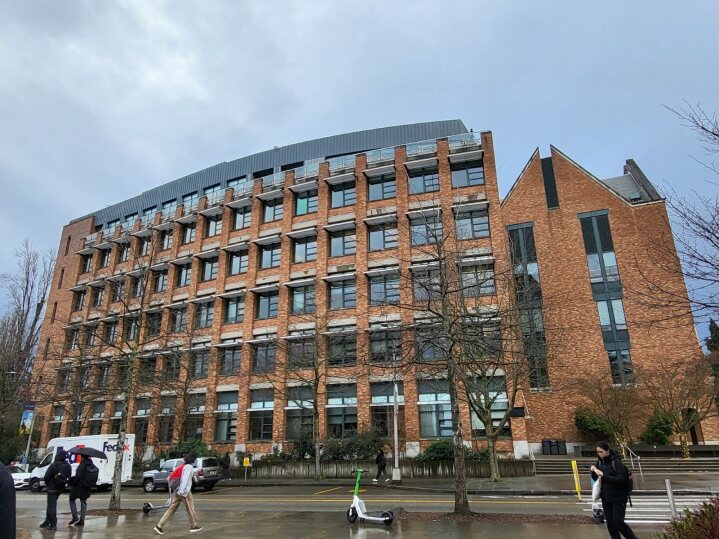Federal funding cuts spark backlash at UW Seattle
Academic workers, students and lawmakers rally against executive orders slashing research grants, while legal battles unfold over funding freezes and NIH caps.
By: Ragvi Baloni
Dozens of academic workers gathered at the University of Washington (UW) Seattle campus on Feb, 19, joining a nationwide protest of the Trump administration’s deep cut to federal research funding.
The demonstration, organized by local labour unions and advocacy groups, highlighted the growing concerns among scientists and students over recent policy changes, which threaten critical research projects.
The administration’s executive orders have placed restrictions on federal grant disbursements, including funding from the National Institute of Health (NIH) and the National Science Foundation (NSF), two of the primary sources of research funding for universities across the country. A 15 percent cap on indirect costs for NIH-funded projects has drawn widespread criticism from the academic community. Indirect costs cover essential infrastructure expenses such as lab maintenance, IT support and compliance services, all of which are vital to sustaining high-quality research.
For UW researchers, the funding restrictions pose an immediate threat to ongoing projects in fields ranging from cancer treatments to using artificial intelligence accessibility, communication, healthcare and transportation.
Fred Hutchinson Cancer Center (Fred Hutch) and UW Medicine maintain a close, collaborative relationship in advancing cancer treatment, research and patient care. As a clinical care partner, Fred Hutch operates as the adult oncology program for UW Medicine, ensuring seamless integration between cancer research and world-class medical treatment. This partnership allows patients to benefit from the latest advancements in immunotherapy, precision medicine and clinical trials while receiving comprehensive care from leading oncologists affiliated with both institutions. Additionally, their joint efforts extend to medical education and training, fostering innovation and developing future leaders in oncology and biomedical research.
“I study the immune system and its role in fighting cancer,” one Ph.D. student told FOX 13. “We have a new insight that could make a big difference for patients, but without proper funding, we won’t have the infrastructure to continue our work.”

The University of Washington stands as one of the world’s leading research institutions, driving innovation and discovery across a wide range of disciplines. With an annual research budget exceeding $1.77 billion, UW’s impact extends beyond academia, fuelling economic growth, job creation, and advancements in science, healthcare and technology. Its faculty, recognized with prestigious honors, include eight Nobel Prizes and over 200 National Academy memberships. The scholars and students contribute to groundbreaking research that influences policy, improves global health outcomes and fosters technological innovation.
Across the campus, similar concerns are being voiced by faculty and students who rely on federal grants to support their research. Pauses on grant awards and payments have already disrupted operations in multiple departments, particularly in cases where UW has received sub-awards with institutions now suspending projects due to funding uncertainty. Sub-awards are a portion of a grant passed from a primary to secondary recipient.
Amid the turmoil, legal challenges have provided some temporary relief. The Washington Attorney General’s Office has partnered with UW and other institutions to file lawsuits against the administration’s policies. On Feb. 21, a federal judge extended a Temporary Restraining Order (TRO) that blocks the enforcement of the NIH’s 15 percent cap on indirect costs. The court is expected to rule on a preliminary injunction in the coming days.
Meanwhile, another federal court order issued the same day halted key provisions of the executive order directing agencies to terminate all equity-related grants and contracts. These grants and contracts typically fund programs aimed at increasing access to education, research opportunities and economic support for historically marginalized communities. They often support initiatives in higher education, workforce development, healthcare equity and small business support, among other areas. While the ruling doesn’t prevent federal agencies from investigating institutions over Diversity, Equity and Inclusion (DEI) initiatives, it blocks immediate enforcement of grant terminations.
Despite these legal cases, some researchers remain wary of the long-term consequences. The broader freeze on federal disbursements issued by the Office of Management and Budget (OMB) in late January, though later rescinded, briefly disrupted funding pipelines and left lingering uncertainty over future grant approvals.
University leaders have emphasized that these funding cuts extend beyond research, impacting jobs and economic stability. Indirect costs help sustain thousands of positions in laboratory operations, compliance, custodial services and clinical research.
“Withdrawing support for these critical expenses would unquestionably stifle innovation and delay advances in areas like cancer research, neuroscience and infectious disease,” UW officials said in a statement.
As legal battles continue, UW remains in close contact with its federal and state partners to advocate for stable research funding. In the meantime, faculty and students are protesting for the resources necessary to sustain scientific discovery.






